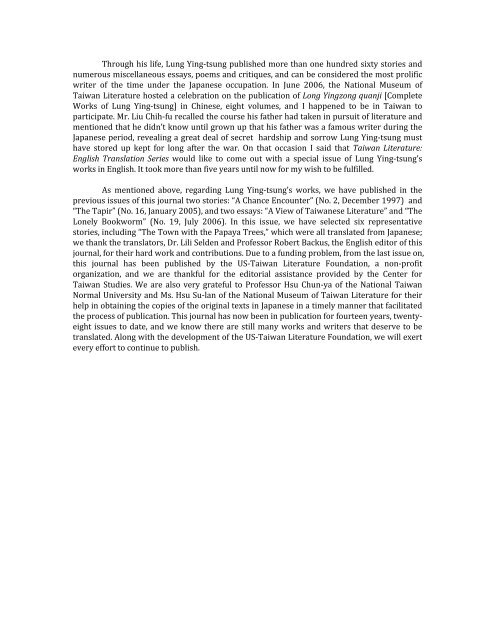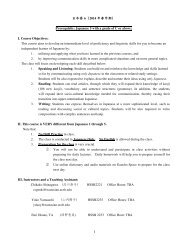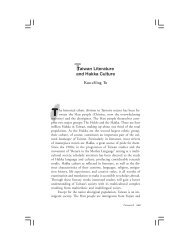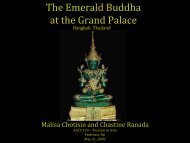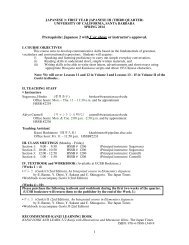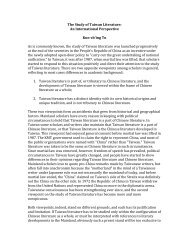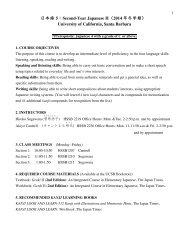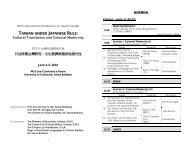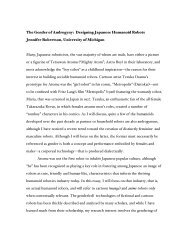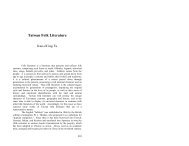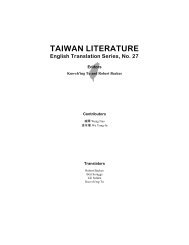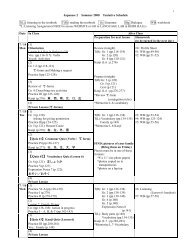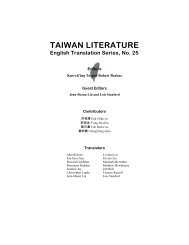L T - Department of East Asian Languages and Cultural Studies
L T - Department of East Asian Languages and Cultural Studies
L T - Department of East Asian Languages and Cultural Studies
You also want an ePaper? Increase the reach of your titles
YUMPU automatically turns print PDFs into web optimized ePapers that Google loves.
Through his life, Lung Ying-‐tsung published more than one hundred sixty stories <strong>and</strong> numerous miscellaneous essays, poems <strong>and</strong> critiques, <strong>and</strong> can be considered the most prolific writer <strong>of</strong> the time under the Japanese occupation. In June 2006, the National Museum <strong>of</strong> Taiwan Literature hosted a celebration on the publication <strong>of</strong> Long Yingzong quanji [Complete Works <strong>of</strong> Lung Ying-‐tsung] in Chinese, eight volumes, <strong>and</strong> I happened to be in Taiwan to participate. Mr. Liu Chih-‐fu recalled the course his father had taken in pursuit <strong>of</strong> literature <strong>and</strong> mentioned that he didn’t know until grown up that his father was a famous writer during the Japanese period, revealing a great deal <strong>of</strong> secret hardship <strong>and</strong> sorrow Lung Ying-‐tsung must have stored up kept for long after the war. On that occasion I said that Taiwan Literature: English Translation Series would like to come out with a special issue <strong>of</strong> Lung Ying-‐tsung’s works in English. It took more than five years until now for my wish to be fulfilled. As mentioned above, regarding Lung Ying-‐tsung’s works, we have published in the previous issues <strong>of</strong> this journal two stories: “A Chance Encounter” (No. 2, December 1997) <strong>and</strong> “The Tapir” (No. 16, January 2005), <strong>and</strong> two essays: “A View <strong>of</strong> Taiwanese Literature” <strong>and</strong> “The Lonely Bookworm” (No. 19, July 2006). In this issue, we have selected six representative stories, including “The Town with the Papaya Trees,” which were all translated from Japanese; we thank the translators, Dr. Lili Selden <strong>and</strong> Pr<strong>of</strong>essor Robert Backus, the English editor <strong>of</strong> this journal, for their hard work <strong>and</strong> contributions. Due to a funding problem, from the last issue on, this journal has been published by the US-‐Taiwan Literature Foundation, a non-‐pr<strong>of</strong>it organization, <strong>and</strong> we are thankful for the editorial assistance provided by the Center for Taiwan <strong>Studies</strong>. We are also very grateful to Pr<strong>of</strong>essor Hsu Chun-‐ya <strong>of</strong> the National Taiwan Normal University <strong>and</strong> Ms. Hsu Su-‐lan <strong>of</strong> the National Museum <strong>of</strong> Taiwan Literature for their help in obtaining the copies <strong>of</strong> the original texts in Japanese in a timely manner that facilitated the process <strong>of</strong> publication. This journal has now been in publication for fourteen years, twenty-eight issues to date, <strong>and</strong> we know there are still many works <strong>and</strong> writers that deserve to be translated. Along with the development <strong>of</strong> the US-‐Taiwan Literature Foundation, we will exert every effort to continue to publish.


